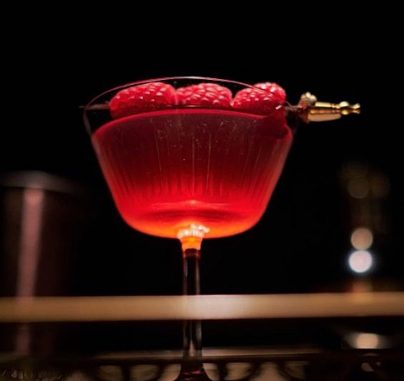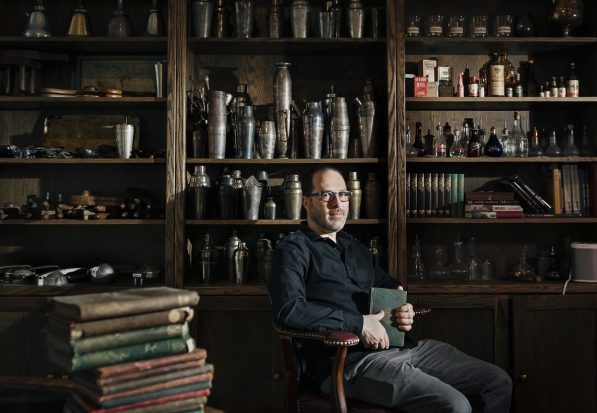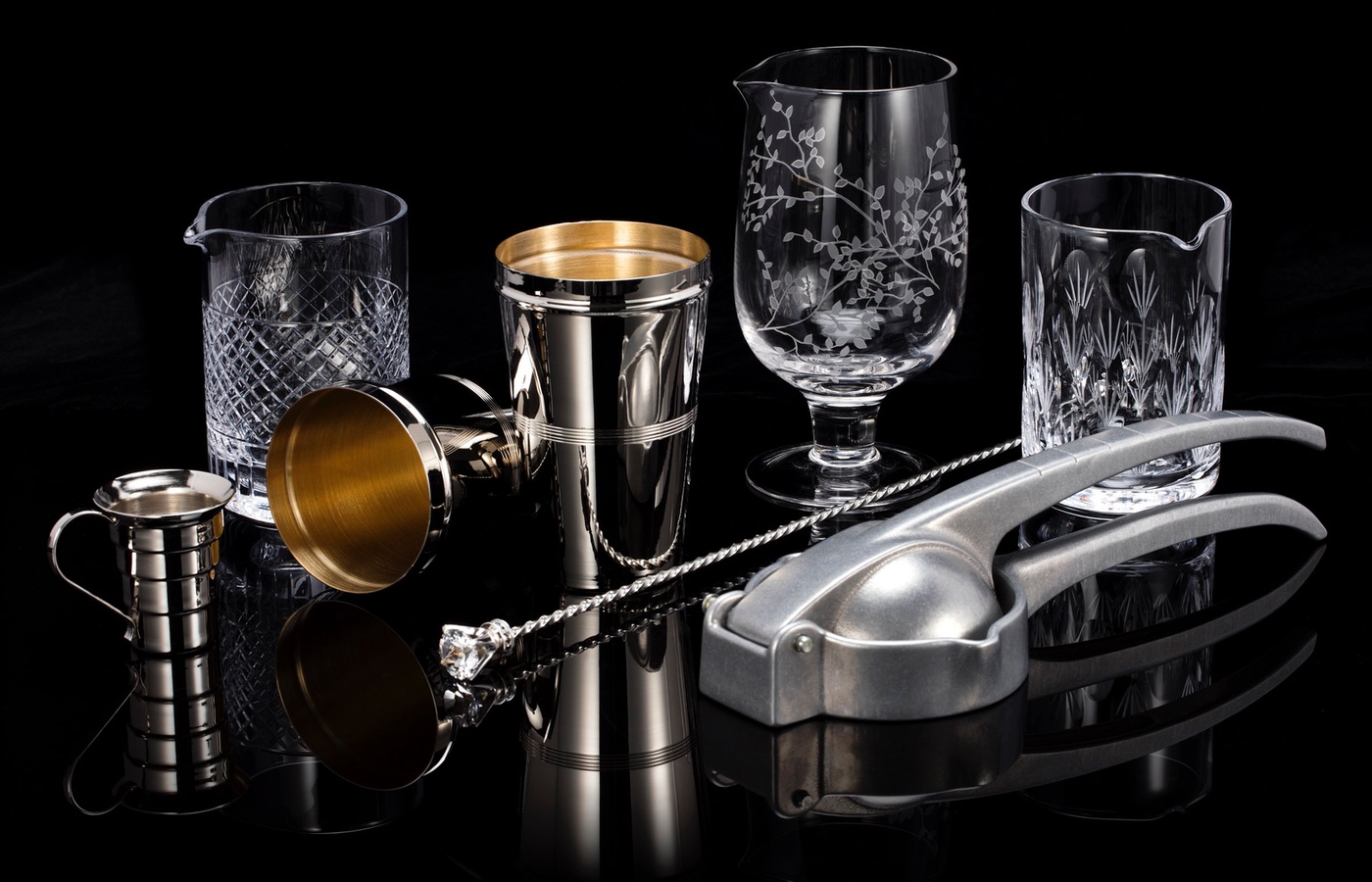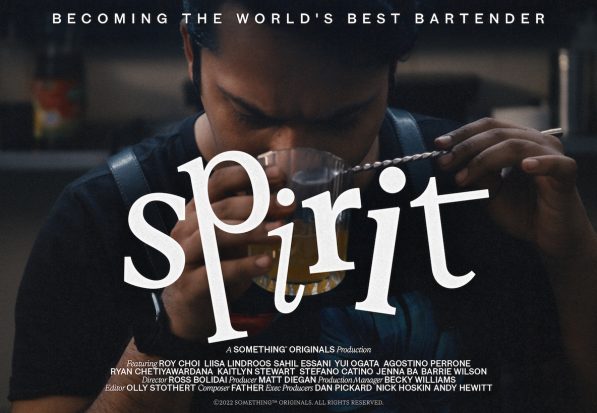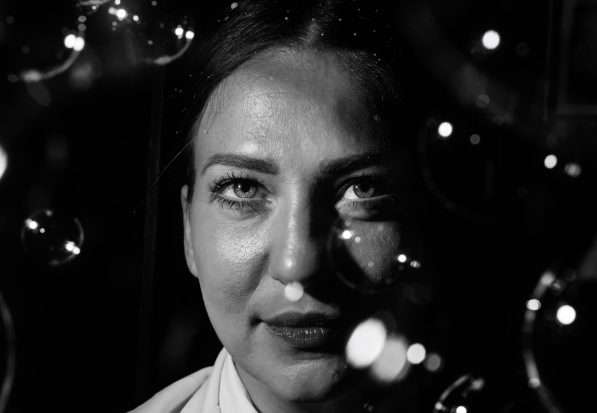Tiff: As more and more people took to making drinks at home during the pandemic, the need for home bar tools has grown exponentially over the last two years.
At the forefront of supplying this need is New York cocktail tool company, Cocktail Kingdom. But beyond just supplying tins, muddlers and glassware, Cocktail Kingdom has their signature range with contributions from some of the biggest names in the industry.
We talked to owner Greg Boehm about pivoting through the pandemic, creating speciality lines and working with bar personalities.
Thank you for joining us, Greg.
Greg: Thanks for having me.
Tiff: Now you've been supplying some of the world's best bars, both commercially and home-based since 2009, would you describe this as the strangest time the businesses had to live through?
Greg: Yeah. Cocktail Kingdom really started with no business plan and we've felt our way through good times and bad, but this has certainly been a time where we need to exercise every amount of flexibility that we have.
Tiff: With the majority of your sales, going to venues, commercial venues, the pandemic must've been quite a blow.
Greg: Oh, yes, absolutely. We have always been a barware company that focuses on professional barware for professional bartenders. So selling to bars, restaurants other types of venues. So with those being closed and that being by far the focus of our business, it was certainly a shock to our system.
Tiff: So I assume that how you got through it was to pivot towards home bartenders?
Greg: Yeah, pretty much instantly. As soon as I became aware that the world was changing which was very early on when everything started becoming problematic, we completely switched the focus of our company from selling to professionals to focusing on home users.
Within a week, after bars and restaurants started closing, we were changing the way that we were focusing our marketing efforts and our communication through social media, for example, completely changed its focus.
Tiff: Talking of social media, were you targeting just bartenders or were you looking for other Instagram influences, for example, to help your marketing there.
Greg: So where originally we only targeted everything towards bartenders and bar owners and restaurant owners, we instantly changed and went to influencers who were focusing on both food and beverage for home users. And luckily, a lot of bartenders that could not work at a bar at that time also started having their own social media outlets.
They were creating new social media pages and they were intimately familiar with Cocktail Kingdom, so that also was just a little bit of luck on our side, that people that were using bartenders that were using our products in their bars, started recommending it to home users as well, but we definitely pivoted and focused on people that had social media, presences that were geared towards home users
Tiff: Beyond just the marketing though, how difficult was it to pivot?
Greg: It was, we just had to be flexible. It's very difficult in the sense our order size went from a large order, let's say opening a new bar to a home user who needed one of this and one of that. And so the corrugated boxes that we might have in the warehouse weren't necessarily the right-sized corrugated boxes.
And the volume of orders changed, where it was a lot of smaller orders. It was definitely difficult and a challenge, but we hit the ground running. And as a business owner, your main goal is to keep your business in business, so nobody loses a job. So we took it seriously and did everything that we could, but it was unusual, it was different.
Some of our best-selling items were a little bit different, some fancier, high-end items, some more decorative items, as opposed to the real nuts and bolts items that a bartender would be using at a bar on a busy Saturday night.
Tiff: I suppose you were in a very similar situation to the alcohol companies where, by focusing on home users, things kept going, but you were doing nowhere near the volume.
Greg: Yes and no. We definitely had a time for about three weeks where we had to reduce salaries and consider our options. But within two months we righted the ship and really didn't skip a beat. So through our efforts and my team's efforts to get the word out there, that we were able to ship, we also were a little bit ... I dunno, fortunate, organized. I'm not exactly sure what it was, but we never stopped shipping the same or the next day. So all orders were getting out the door extremely quickly. So where other people were having issues, our warehouse really, they were heroes for us, they came through. And so we ended up winning a lot of new customers over it cause we were able to get the products to people extremely quickly.
Tiff: Did you have to, you talking about the sort of products that we're going out with different than what would go out for a mainstream bar, were you sourcing new products to actually cater for the home market?
Greg: No, just what we had within our product mix, some different things sold because while the majority of our business is for cocktail bars and high volume, we do have some items that are a little fancier for lower volume, fancy cocktail bars. And a lot of those products started selling to the home user as well, but we didn't change our product mix at all. We have some gifts, that's like the essential sets, which have a shaker and a strainer, and it's basically everything you need in an essential cocktail set, those we just couldn't make them fast enough, cause we build them from pieces. So we had to really have a lot of essential sets which was a good seller for us before but became our best seller.
Tiff: What other things, other than the sets, what other items ended up selling most?
Greg: A lot of the glassware we make nice coupe and Collins glasses and things like that and people that had become accustomed to going to bars to get their fancy cocktails were now making them at home. And when you're stuck at home and you can have your fancy cocktail, making it at home, in the right glass really resonated with people. And I found that people wanted the correct glass for the correct cocktail. So you didn't want to be drinking out of just any old tumbler that you happen to have at home.
Tiff: As the lockdown continued, did you find that home bartenders were expanding their equipment beyond the basic kits as their skills grew?
Greg: Yeah, absolutely.
People would contact us and said, what's the next step? And what should we do? And both people with stainless steel barware went to copper barware, just to make it a little bit fancier. And they were getting more specific in terms of the barware they used, instead of having just one set of bars where they would want something better for their shaken drinks, for their stirred drinks, maybe upgrade their mixing glass.
You definitely had a lot of return customers combined with the fact that we shipped so quickly. So people knew what they ordered. They would get it right away, or at least extremely quickly. So we definitely saw people upgrading their barware
Tiff: It must've been a little bit difficult in terms of the supply chain at your end to ensure that you had all of these products in the quantities that you needed them.
Greg: Uh, Certainly as things went on as this situation dragged on and on, it's become extremely difficult to keep inventory, again, because our sales actually were quite good, and then yes, managing our inventory became a nightmare and we have had products that are out of stock every week.
Now it's getting better and better, but we're definitely not out of the woods yet. There are some of our products which sell well, we just can't manufacture fast enough, we can't get them in with all the shipping. I'd say everything you hear on the news is true and getting our supply of barware that we need into our warehouse has been extremely difficult and our staff is doing the best they can and doing a great job, but a lot of it's out of our control.
Tiff: How would you say this period has changed the company in the long run?
Greg: I don't know yet. It's definitely changed the company in the long run for sure, but I don't know how yet. We had two full floors in an office building in New York City, which we now have left and we're moving into a much smaller space and most of the staff is working from home.
We will be reopening a showroom here in New York City next month. So that's going to be opening soon. But the communication is different, really, that is an open question still because our communication has changed and it's changed our interactions with each other as with the staff, but I really don't know yet how it's changing. I feel that's really the great unknown.
Tiff: You talk about opening a Showroom. Would you consider actually opening a retail store?
Greg: Well, It is a retail showroom. We've always at Cocktail Kingdom had a retail showroom, but it was almost like speakeasy style. It was on the fifth floor of an office building in Manhattan.
So we're now getting slightly less hidden and we're moving to the second floor, so you can actually, you don't have to take an elevator now you can walk up the stairs and it's going to be right next to one of our bars called Mace, which is a well-known cocktail bar in New York. So it's going to be on the same block, basically above that bar. So we will have a retail presence that is opening soon.
Tiff: Now, once everything started to open up and bars started to be serving people again, it must've been a bit of a mad scramble for them to get equipment and for you to not only be dealing with home bartenders but now the bars as well, was that difficult?
Greg: That actually wasn't as difficult because the world didn't start opening up all at the same time and cocktail kingdom is quite an international company, we do ship to most countries in the world. So even within the United States, not every state started opening at the same time. So we saw it coming, it was that it was happening, and then you saw state by state. So that was actually fairly manageable again with the supply side problems and inventory issues, it was painful in that we did not always have what people wanted, but that wasn't as bad in the sense that. Yeah, not everything opened at the same time, it was over a course of about three or four months, so we were able to handle that and it didn't cause any delays in our shipping or anything.
Tiff: Now, looking at your signature range, you've collected some pretty impressive names. How did that all start?
Greg: Yeah. Our signature collections have really been a lot of fun. So while most of our barware is meant to be used in a high volume bar on a Saturday night, not all the signature collections fall into that.
So, we started with Jeff Beachbum Berry, who wrote the book on Tiki cocktails and started creating some barware and new bar spoons and ceramic mugs and things with him. And then it just started growing. It grew to having things with Dave Wondrich, who's a well-known cocktail author and historian. A bunch of others, like the who's who of the cocktail world, started joining in most recently, Audrey Saunders joined us to create a sour glass that has been actually a really strong seller, even better than I expected based on drinks that she would serve at the Pegu Club and how she envisioned a sour glass should look with historical cues.
So we started working with people that I guess I had just known over the years, my heroes within the cocktail world and reached out to them to start developing barware.
Tiff: So it was a case of you approaching them rather than them having an idea and coming to you.
Greg: Yeah. I think I'm trying to think if there have been any exceptions to that, but yeah, mostly we went to the people that we wanted to work with and asked, what barware either they felt should be on the market and isn't, or what could be made better or what historical items were they aware of that we could recreate? And each of the lines is very much based on what each person thought was important. So Jeffrey Morgenthaler that we work with has more of a modern aesthetic and a champagne sabre, which he thought would be a nice thing to have on the market.
Nico DeSoto has a double teardrop spoon. So there isn't actually a spoon on his mixing spoon. It's both sides have a teardrop shape, which is how he thought it was important because he saw a lot of bartenders stirring with the back of the spoon instead of the spoon side. And then, yeah, again, I mentioned Audrey Saunders, creating things that were historically based and Dave Wondrich has quite a large line and most of his products were things from either his collection or my collection of antique barware that we thought were wonderful things that have been lost over the years.
Tiff: Are the personalities involved actually designing these pieces themselves? Or are they consulting with it or are they just suggesting and your seeking designers outside of them?
Greg: Yeah. Yeah. It's completely, they're completely hands-on with all of them. Recently working with Jim Meehan to create a set of measuring spoons and it was his idea and then we do the drawings and we do all the CAD drawings in-house and then get 3d samples made. And he was involved in every step of the process to make sure it was exactly how he envisioned it coming out. So everybody that we worked with was extremely involved in the process.
Tiff: Now, some of these pieces are practical, others are really quite quirky, is there a guiding light in how you decide what to include or whether it's worth including?
Greg: It's a balance. So definitely we're looking for items that are unique, that are both aesthetically appealing, but extremely functional. And we do of course consider sales, to I mean, if something is too unusual and nobody knows how to use it, then that would definitely negatively affect sales.
So it's really a balance on what is out there and what isn't out there that we decide what to bring to the market. But these are strongly based on personality. Our signature collections at Cocktail Kingdom, are not, basically, business decisions, they're more based on what we want to do and what's fun, and what's gives it gives us the energy to keep doing what we're doing.
Tiff: Putting some of these products into production though must be a fairly major undertaking. Can you talk us through the process?
Greg: Yeah, sure. It really varies a lot, depending on whether it's ceramic glass metal wood. But after we do a sketch, then we do a mechanical drawing.
And as I mentioned earlier, we will do a 3d print of something and then we'll go into sampling. And from the samples, anything can happen. It's rare that the sample comes out perfectly the first time. We get a workable sample and then we try for a strainer, for example, we use the strainer and see how well it strains, how well it functions.
And then we go back and forth also developing the packaging, cause all of the things in the signature collections come in packaging as well. So our department develops that. And then it's just going through prototype after prototype until we get them. Certain things took a long time, like the Jim Meehan bar spoons to get them exactly accurate.
It's shocking out there, most are spoons, most measuring spoons in your kitchen are not accurate. And we wanted ours to be extremely accurate. So it sounds easy. It's not easy. So again, it's a bit, I wouldn't really call it trial and error, but it's a lot of creating prototypes, having them send over both to the people at the cocktail kingdom staff and the person whose signature collection it is and making sure they're functioning the way they should. But it's really just time and back and forth. And now with things taking so much longer to develop with a lack of raw materials and even shipping, taking longer, developing things have become a bit of a nightmare, but still getting it done.
Tiff: Would you say that they fill a gap in the market?
Greg: Yeah. I mean, That's not the purpose exactly that we do it, but there are certain. There was a lack of very high-end practical barware, which I do think fill that gap, which is not exactly why we did it. Why do you think Dale DeGroff has a Brûlot set, which is a flaming coffee drink that was made famous in New Orleans. And there certainly, that did not exist in the market, but if you want to make an extremely high-end flaming coffee drink and a beautiful copper vessel, this is it. In the Dave Wondrich line, as well, I just think we're, it fills that niche, which is fancier than it has to be for practical purposes, but still very functional barware
Tiff: Now you mentioned that some of the collections have a somewhat modern twist to others are looking to historical barware. Can you talk us through the personality of each of the collections?
Greg: Yeah, so the Audrey Saunders line is a balance between aesthetics and functionality except that her sour glass is what we have released so far.
We have more products coming with her, but everything, the aesthetic there's a certain softness, but functionality to everything. Jeff Beachbum Berry, the Beachbum Berry line is straight-up Tiki. Things have a tropical spin on them and based on historical things like some of the glassware that he has, were things ...the Pearl diver glass, for example, was something, he's like, there's this amazing glass called the Pearl Diver, but I can't find one and I want to bring it back. We're sitting at my desk and Cocktail Kingdom offices where I have all of my antiques. I'm like, you mean this? And I reached behind me and out of a cabinet, pulled a, pulled a Pearl Diver glass out. And we decided to recreate that. So again, retro things. The Dale DeGroff, we have the Brûlot set, which is classic new Orleans style.
Dave Wondrich has the most historical stuff, the Dave Wondrich collection is full of historical items that are extremely rare that you find the original on eBay are going to be worth hundreds, if not thousands of dollars. And we recreated mixing glasses, strainers, bar spoons from the rarest stuff. With Gaz Regan, we have done a couple of things, which that's kind of our most humorous thing that we did, because he was known for making a finger stirred Negroni. So we literally took a plaster cast of his finger and then it turned it into a mixing spoon. And then also we had been working on a project and he, unfortunately, passed away. We were working on a muddler with also an ice stamp, a metal ice stamp built into it, which was his logo. So we released that for charity after he passed away. Jeffrey Morgenthaler's signature collection is definitely more on the modern side. He has a little, a book, a blotter as we call it, where you can take notes and it's based on how he works. He always used something similar to that, a notebook. And so we did a notebook with him cause that's how he teaches people to bartend and what he recommends. As well, as I mentioned, a champagne sabre, because why not have a champagne sabre? Nico De Soto, a famous bartender, who's my partner at a bar, Mace and he has the mixed tin, which is a double-walled, metal, mixing vessel, which for stirred drinks, he just wanted something that was practical, unbreakable because he travels the world.
He travels more than any human being I've ever met in my life. And having an unbreakable mixing glass was certainly appealing to him. And then with Robert Simonson, who's a writer and historian, we did an Old Fashioned cocktail set because he was catering more to the home user. And finally, as I mentioned, a few times, Jim Meehan, we've just done the one product with him, and that was based on his desire to have a set of measuring spoons that were both accurate, attractive, and in volumes that were useful for bartenders. So that's our signature collection. We are expanding them, I can't say yet because we have a couple of other lines coming out in the near future.
Tiff: I was about to ask, are you looking to add new bartenders and personalities to the collection in the future?
Greg: I just got off a phone, exciting phone call with somebody who we're going to be doing a few different products with her. And I'm really excited, but I can't talk about it yet.
Tiff: When could we expect to see those?
Greg: The products will, early next year, early next year. So probably February or March of next year, given the time, how long it takes to develop things. We had the brainstorming chat today. And then we have to do some drawings of some of the things and get quotes on how much they'll cost a manufacturer, to make sure that we can get the product to market at a price that is acceptable to the public. And go from there.
Tiff: I was about to ask it how long is the process from idea to in your hand?
Greg: It depends on the base material, something like ceramic can be as quick as five months and something with glass or metal can be as slow as 14 months.
Tiff: What's your favourite piece from the collections?
Greg: It's a little tough to say because I have a personal connection with almost everything. My favourite setup I make a lot of dark stirred drinks, that's just my preference. Although I'm an equal opportunity drinker in general. The Berry Wall Mixing Glass and the Lindley Pick strainer, which are both in the Dave Wondrich collection are my favourite setup.
it's a stemmed mixing glass. It's actually got a pink tinge to it historically based. And then the Lindley Pick strainer is the first patented strainer ever. It's actually the second version of it, so it was first patented in the late 18 hundreds and then 1907 was the first time a Hawthorne strainer, which is a type of strainer that has the coil on it, that grew ears, so instead of just being a strainer that we put into the glass, it had ears that kept it from going into the glass. So it rests on top of the glass. So the Berry Walled mixing glass with the Lindley Pick strainer. It pours beautifully. It's glamorous, it's practical. It's kind of everything that I'm looking for in a mixing glass and a strainer combo.
Tiff: I'm interested in your own collection. It sounds like you would actually have an amazing collection of vintage and modern barware.
Greg: It's funny, as we were saying, I literally have the original Lindley pick strainer from 1907 in my hand, I'm just fidgeting with it, try not to bang it against anything right now.
So I have, what's probably the largest collection of antique cocktail books in the world. And it's a working research library, that's housed at the new showroom, that's going to be opening for Cocktail Kingdom.
So my book collection of antique cocktail books is pretty insane. It's thousands of books. And along with that, we, I have a large collection of antique barware, both cocktail shakers, strainers, bar spoons. And we take cues for, not just the signature collections, but for all of Cocktail Kingdom. And we do take cues from barware that was made well in the past. So I have a very large collection, which has been in boxes until we open our new showroom and library. So I'm very excited to get that unboxed and be reunited with my barware.
Tiff: Right now you mentioned that you dispatch all over the world. Are there any new markets that you still want to reach?
Greg: The markets that I wish to develop more cause we already shipped to, I'd have to check, but eighty countries, something like that.
I'm definitely trying to expand the market in Japan, a little bit because there is quite a good variety of barware available in Japan, but I definitely have an interest in, I go to Tokyo on a regular basis during normal times. And that's been a market that we've been focusing on, but growing the markets that we're already in, which is certainly most of the major markets, but there are no markets really that we're trying to develop aggressively at this point, it's sort of natural growth.
Tiff: All right, Greg. Look, thank you so much for taking the time to speak to us today. If people want more information about the signature range or any of your other bar tools, they can, of course, go to the website, which is cocktailkingdom.com or connect with the brand via your socials.
Greg: Absolutely. You'll find us on Instagram and Facebook and at Cocktail Kingdom.
Tiff: Excellent. All right. Thank you again.
Greg: Very, thank you so much. Nice chatting with you
